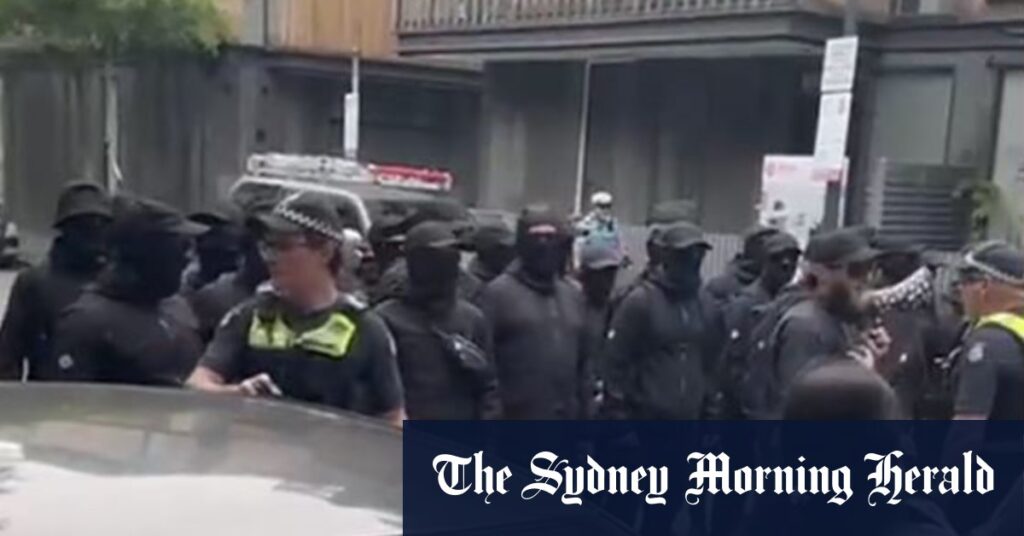“Which is exactly what the National Socialist agenda was in 1930s and 1940s Germany,” he added.
“While it’s a small group, their ideology is inherently hate-filled [and] it is inherently violent.
“Even if they’re not enacting violence in the streets, they certainly are enacting that violence online through the rhetoric and dialogue, and our laws have not caught up.”
Why were they able to disrupt the refugee rally?
Roose’s colleague, Deakin law school associate professor Dr Maria O’Sullivan, said the reasons why neo-Nazis were not arrested at protests were complex.
In Victoria and NSW, it is illegal to display Nazi symbols or perform Nazi salutes in public. The maximum penalty for the crime is a $23,000 fine or up to a year in prison.
Loading
But, in the absence of Nazi symbols or salutes, there was nothing to stop protests with “uncomfortable” or offensive messaging, O’Sullivan said.
In 2014, the Napthine government gave police broad powers to move people on — including when protesters were obstructing buildings or traffic — but the Andrews government repealed those laws in 2015, and introduced an exception for protests.
The issue is whether the presence of neo-Nazis was considered a genuine protest, a counter-protest, or a riot or attack instead, O’Sullivan said.
“If we do characterise it as a protest, there is this exception in Victoria to the move-on powers … but the police still have a general power about the breach of the peace,” she said.
If Tuesday night’s protest went to court over chants of “white power” and “hail victory”, they would not meet international human rights law thresholds for violence, O’Sullivan said.
“It’s uncomfortable to hear these chants, but chants don’t meet that threshold,” she said.
The same went for banners, O’Sullivan said.
What does the government say?
The state government is looking at how it can strengthen Victoria’s anti-vilification framework. New draft anti-vilification laws were set to be ready by the end of the year, Premier Jacinta Allan said on Wednesday.
The laws are expected to bolster penalties, make it easier for Victoria Police to prosecute offenders, and separate the offences of incitement and making threats.
But Roose suggested it could be worthwhile having anti-association rules for neo-Nazis, like those for members of outlaw motorcycle gangs, noting they often moved between different messaging platforms to communicate.
“[It would be a] continuous process of catching up to where they are [online], but even denying them their ability to physically interact has some merit,” he said.
Loading
“[But] we have to very careful. We operate in a democratic society where people can hold extreme views.”
Police could demand protesters remove masks when there was a pre-organised “designated” demonstration, Roose said, but neo-Nazis did not notify authorities about their action.
O’Sullivan also cautioned that criminalising a specific group, rather than types of actions, could be a slippery slope. Australian law had to be clear and consistent, and should not favour or disfavour specific groups, she said.
Allan on Wednesday condemned the neo-Nazis who attended Tuesday night’s refugee rally as “disgraceful cowards”, saying: “They hide behind masks, and they absolutely do not represent any single part of this great state.”
Opposition Leader John Pesutto said he was disgusted by the neo-Nazis, and the Victorian Liberals would look at the anti-vilification laws when they were brought to parliament.
Anti-Defamation Commission chair Dr Dvir Abramovich said he was appalled and outraged by Tuesday night’s “evil display”.
Our Breaking News Alert will notify you of significant breaking news when it happens. Get it here.
Read the full article here

